

Nice to see more sunshine and some real warmth, if only occasionally.
This morning (Friday) my wife and I popped into see our son for a coffee and I advised him on some minor pruning of his espalier apple trees. The tree format was changed from a centre leader to espalier in 2019 when he moved the trees from the front of house to a much more suitable and sunnier site in the back garden.
While the trees are not a 'perfect Espalier format' they are doing well and have been producing superb quality apples over the last few years. We are now trying to maximise the fruiting area (buds) while keeping vegetative growth under control, with late winter and summer pruning!
Classic Espalier format
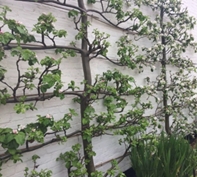
Pruning the Espalier (modified trees)
Below: left to right. Gala - Braeburn - Scrumptious - Bladon Pippin (before pruning)
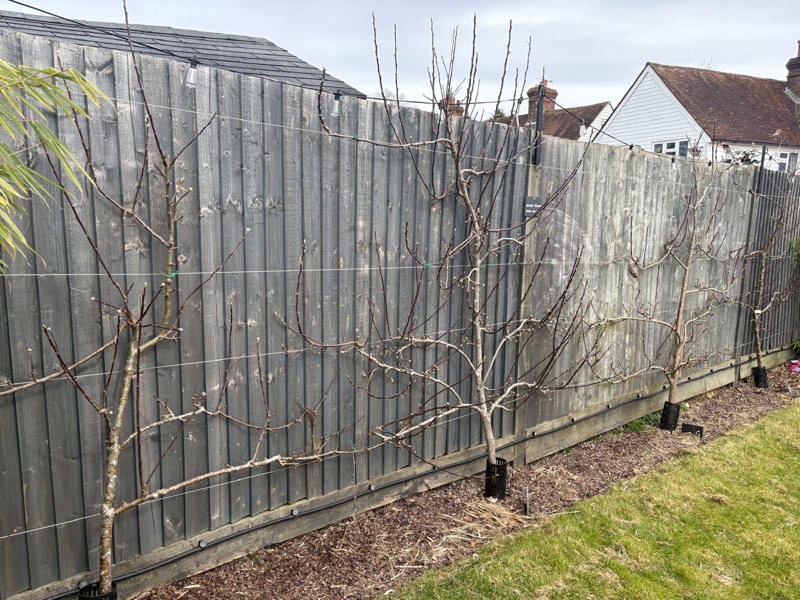
Below: Unpruned Braeburn tree
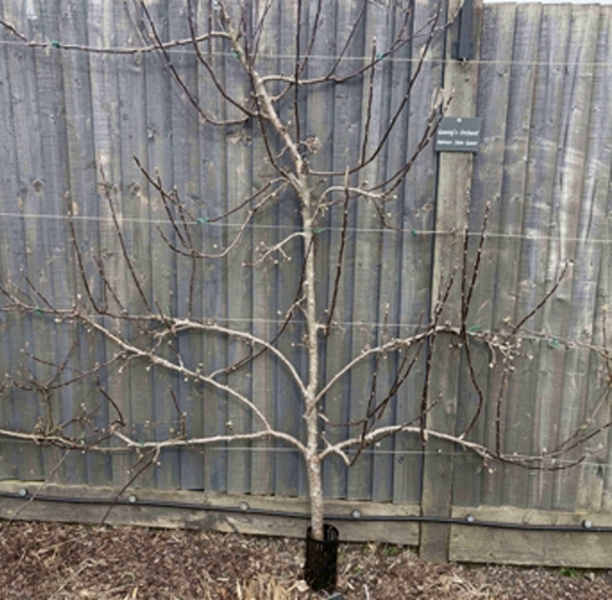 As mentioned these trees are a modification from a centre leader tree, trained into an Espalier format
As mentioned these trees are a modification from a centre leader tree, trained into an Espalier format
Although we summer pruned them in early July, the trees and particularly the Braeburn have made strong new vegetive growth in late summer of 2024.
Below my son Stuart removing upward & outward growing strong growth from last summer
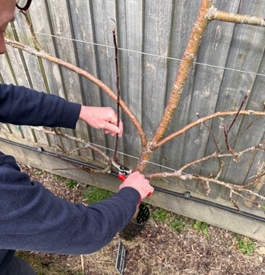
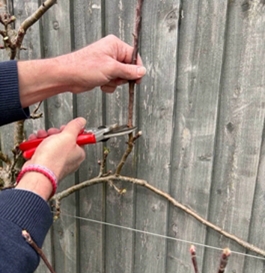
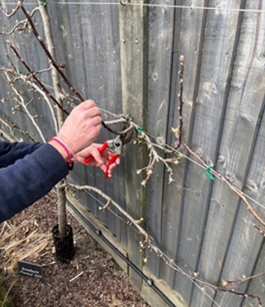
Below: Braeburn tree after pruning with last summer's growth removed and fruit buds defined
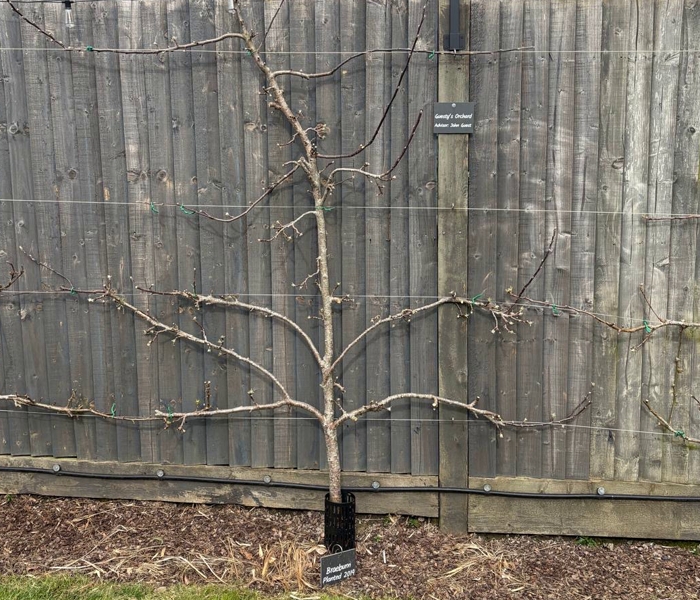 Having removed unwanted summer growth, and trained any leading branches along the support wires, the tree now displays a 'reasonable Espalier shape.
Having removed unwanted summer growth, and trained any leading branches along the support wires, the tree now displays a 'reasonable Espalier shape.
The next pruning will be 'summer pruning' (around end of June early July) where any new summer growth will be pruned back to a couple of buds. This will encourage new fruit bud forming and open the tree to more sunlight improving red colouration and fruit sugars.
Below: left. Braeburn tree and right. Bladon Pippin tree last summer
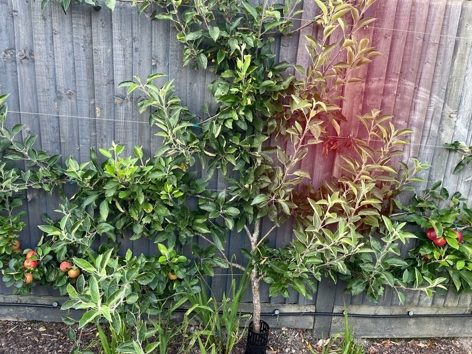
This simple format delivers a small orchard without dominating the garden space and much enjoyment as well as tasty apples from late August to November ![]()
Below: An update from Ali Capper at British Apples and Pears
Food inflation is on the rise again, according to British Apple & Pears Limited (BAPL), the UK top fruit grower association. The anticipated increases in apples are a direct consequence of government policy to increase the costs of employment.
From 6th April 2025, British apple and pear growers - along with many other businesses, including retailers - will be managing increases to employers' National Insurance (from 13.8% to 15%) combined with a reduction to the threshold for employer's NI, and a rise in the National Living Wage.
Andersons Farm Consulting has estimated that the combined impact of these costs will be a 7p increase in the median cost of producing a kilogram of apples (from £1.33 to £1.40). Employment costs now account for half of the total costs of producing British apples and pears and it is this high level of wage cost that makes the impact so significant for growers.
"Growers margins have been stripped to the bone, so these increases in the cost of producing British apples and pears will have to be passed on to retailers, who have already said they will have to pass on wage rises to consumers." Explained Ali Capper, executive chair of BAPL. Unfortunately, the end result is that shoppers will end up paying higher pear and apple prices.
"Given the global climate crisis and increasing geopolitical volatility, food security should be a key priority for all of us. We have the ideal climate for growing apples and pears. Our farmers are ready and willing to grow more healthy, environmentally-friendly and delicious British apples and pears to help reduce our reliance on imports. We just need the government to recognise that and stop putting barriers in our way."
While the immediate priority will be managing labour costs, the continued pressure on British apple and pear growers is also impacting confidence and longer-term investment plans.
In late 2024, following the budget announcements, BAPL asked its members how confident they were feeling about the future. Only 17% said they were feeling more confident than a year ago, with almost half (43%) saying they felt less confident.
A major consequence of lack of confidence is less investment in orchards. In another survey, growers and grower packers were asked about their fruit storage investment plans. Four in five (81%) of growers said they were not planning on building any new storage faciliities in the next five years. Asked why they were cutting back on future investment, respondents said that low returns, lack of confidence and greater financial uncertainty caused by budget announcements were key reasons for the investment slow down.
The October budget created two challenges for growers - one on wages and the other on proposed inheritance tax (IHT) changes.
Ali Capper explained why the IHT changes are causing so much concern among British apple and pear growers: "Farm assets such as land, worker housing, cold storage and packhouses are capital employed and should not be taxed on the death of an individual. Instead the government should use the capital gains tax route to tax the sale of business assets.
"Today, if growers follow government advice to try to mitigate the tax, they face huge bills for lawyers and accountants. That's money that should be being spent on new orchards, renewable energy and automation. This is a tax that prevents investment and growth in businesses."
"There is a genuine crisis of confidence in the British apple and pear indsutry." Continued Ali Capper. "It really saddens me that as a direct result of government policy, growers feel unable to invest in the future. New apple and pear stores are expensive, but it's an investment risk that our growers have been willing to take in the past - not any more. The industry is facing an investment crisis that risks the future supply of British apples and pears.
"I really hope that the government will take these warnings seriously. We urgently need policies that will shore up investment and growth in the sector before we start to lose more apple and pear orchards from the British countryside."
![]() That is all for this week
That is all for this week
Take care
The English Apple Man